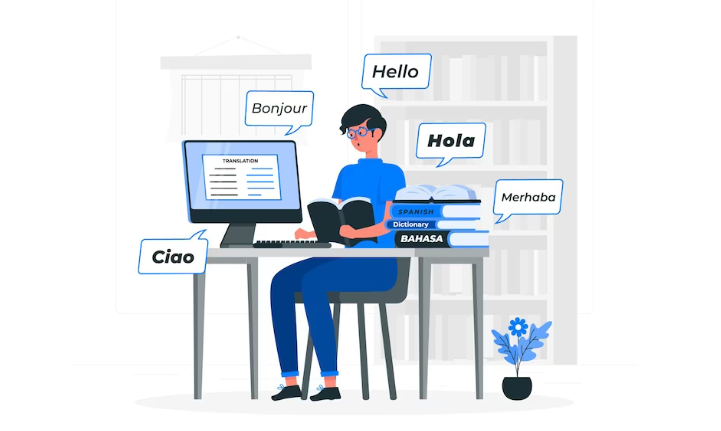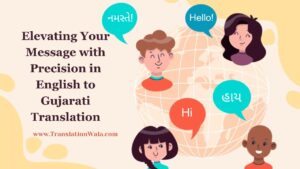I. Introduction (English to Gujarati Translation)
A. Importance of cross-cultural communication:
In the modern, globalized world, cross-cultural communication is an extremely important factor in the development of mutual understanding and cooperative endeavors between various populations. Effective communication across other cultures contributes to the breakdown of barriers, encourages the development of mutual respect, and paves the way for people and organizations to prosper in a world that is more linked.
B. Introduction to English to Gujarati Translation:
English to Gujarati Translation is an important linguistic service that enables persons who speak either English or Gujarati to more easily communicate with one another and share information and ideas with one another. It entails translating text from English into Gujarati, either orally or in writing, with the goal of achieving communication that is precise and respectful to cultural norms.
C. Purpose of the outline:
This outline’s objective is to act as a tour guide for readers as they navigate the many facets of the English to Gujarati Translation and the relevance of each. It will investigate the eloquence of the Gujarati language, the difficulties and possibilities involved in closing the language gap, the implications for businesses and educational institutions, the part that translation plays in facilitating social and cultural exchange, the recent developments in language technology, the transformative power of translation, and the significance of encouraging bilingualism and multilingualism.
II. The Richness of Gujarati Language
A. Historical background and cultural significance:
The Gujarati language can trace its origins all the way back to the early Indo-Aryan dialects, which contributes to its impressively extensive historical legacy. Because it is a reservoir of traditional literature, arts, and rituals that have been handed down through centuries, it carries with it a great deal of cultural value for the people who speak Gujarati.
B. Number of speakers and geographic distribution:
As a result of the Gujarati diaspora, the Gujarati language is spoken by millions of people not only in the state of Gujarat in India but also in a variety of other places all over the globe. The widespread geographical distribution of it highlights the relevance it plays on a worldwide scale.
C. Role as a mother tongue and its impact on identity:
The fact that Gujarati is many people’s first language has a significant impact on their sense of identity and the cultural ties that bind them. It encourages a feeling of belonging and contributes to the maintenance of the one-of-a-kind practices and rituals that are linked with the language.
III. Bridging the Language Gap
A. Challenges in communication between English and Gujarati speakers:
Because of language differences, idiomatic idioms, and cultural subtleties, communication between speakers of English and Gujarati might be impeded, which is why translation is needed for efficient cross-lingual comprehension.
B. Role of translation in fostering understanding:
The process of translation functions as a bridge that permits smooth communication between speakers of English and Gujarati, which in turn promotes mutual understanding and makes cultural exchange possible.
C. Preservation of cultural heritage through translation:
The English to Gujarati Translation plays a crucial part in maintaining and spreading the rich cultural legacy of Gujarati literature, folklore, and traditional wisdom. This helps to ensure that it is accessible to a wider audience all over the globe.
Also Read: New Unlocking – English to Assamese Translation Services

IV. Empowering Global Businesses
A. Role of Gujarat in the global economy:
Because of Gujarat’s internal and worldwide economic importance, English to Gujarati Translation is very necessary for companies who want to do business in this growing economic powerhouse.
B. Importance of accurate translation in international trade:
Clarity and confidence in international business collaborations are both enhanced by the accurate translation of company papers, contracts, and marketing materials from English to Gujarati.
C. Enhancing partnerships and collaborations through translation services:
Translation services make efficient communication and comprehension possible, which in turn helps to develop deeper relationships and collaborations between Gujarati enterprises and their counterparts located in other areas of the world.
V. Enabling Access to Information
A. Language as a barrier to information access:
As a result of constraints caused by language, access to important information and possibilities might be restricted; thus, translation is essential to the process of releasing previously hidden knowledge for Gujarati speakers.
B. Impact of translation on knowledge dissemination:
English to Gujarati Translation broadens access to educational resources, scientific developments, and cultural exchanges, which in turn empowers people and fosters the progress of societies.
C. The role of translation in promoting education and growth:
Translation not only helps bilingual education but also stimulates personal and professional development by making it easier for people to get access to information in both English and Gujarati.
VI. Facilitating Government Services
A. Importance of communication in public services:
Because efficient communication—that is, communication that is both clear and accessible—is necessary for the successful delivery of public services, translation is an extremely useful instrument for fostering good governance.
B. Ensuring equitable access to information through translation:
Translation helps to guarantee that critical government information and services are available to all Gujarati speakers, encouraging inclusion and citizen involvement. Translation also helps to ensure that information and services may be translated into other languages.
C. Promoting inclusivity and citizen engagement:
The ability of people who speak Gujarati to fully participate in civic life and understand their rights and obligations is one of the many ways in which translation promotes inclusion and citizen participation.
VII. Advancements in Language Technology

A. Overview of machine translation and natural language processing:
The possibilities of translation have substantially expanded because to advances in language technology, such as machine translation and natural language processing. These advancements have made translation both quicker and more effective.
B. Complementing human expertise with technology:
When combined, human knowledge and language technology produce translations of superior quality that are able to convey all of the intricacies inherent in both the English and Gujarati languages.
C. Potential challenges and future prospects:
Even while language technology provides some potentially useful answers, obstacles like as linguistic intricacies and the influence of cultural context still exist, driving the need for continued study to develop additional improvements.
VIII. Social and Cultural Exchange
A. Impact of translation on cross-cultural interactions:
Translation encourages meaningful dialogues between speakers of English and Gujarati, which in turn promotes understanding and empathy across cultural boundaries.
B. Enriching literature, arts, and entertainment through translation:
Through the process of translating literary works, works of art, and information related to entertainment, translation enhances cultural experiences and broadens the audience for whom creative expression is available.
C. Fostering empathy and understanding between communities:
The process of translation cuts down cultural boundaries, which fosters empathy and understanding and promotes peaceful interactions between varied populations.
IX. Promoting Bilingualism and Multilingualism
A. Benefits of bilingualism in personal and professional life:
The promotion of bilingualism, which results in cognitive benefits, opens the door to a variety of options, and improves communication abilities, is made possible via translation.
B. Encouraging language preservation and learning:
Translation promotes the protection and appreciation of endangered languages such as Gujarati, as well as the acquisition of new languages and the passing of linguistic skills down through the generations.
C. Nurturing a diverse and interconnected society:
Fostering a feeling of global citizenship and a respect for many cultures may be accomplished via the teaching of several languages and the promotion of bilingualism and multilingualism.
X. Conclusion
A. Recap of the importance of English to Gujarati Translation:
The conclusion places an emphasis on the critical function that English to Gujarati translation plays in facilitating intercultural linkages, the exchange of information, and individual empowerment.
B. Call to action for embracing and promoting language diversity:
The readers are strongly encouraged to support and promote linguistic variety and to acknowledge the benefits of translation in terms of closing comprehension gaps and bridging barriers across languages.
C. Final thoughts on the transformative power of translation:
This blog comes to a close with some musings on the role that translation plays as a transforming force, providing people, companies, and communities with the ability to effectively communicate with one another and engage in cultural exchange.



